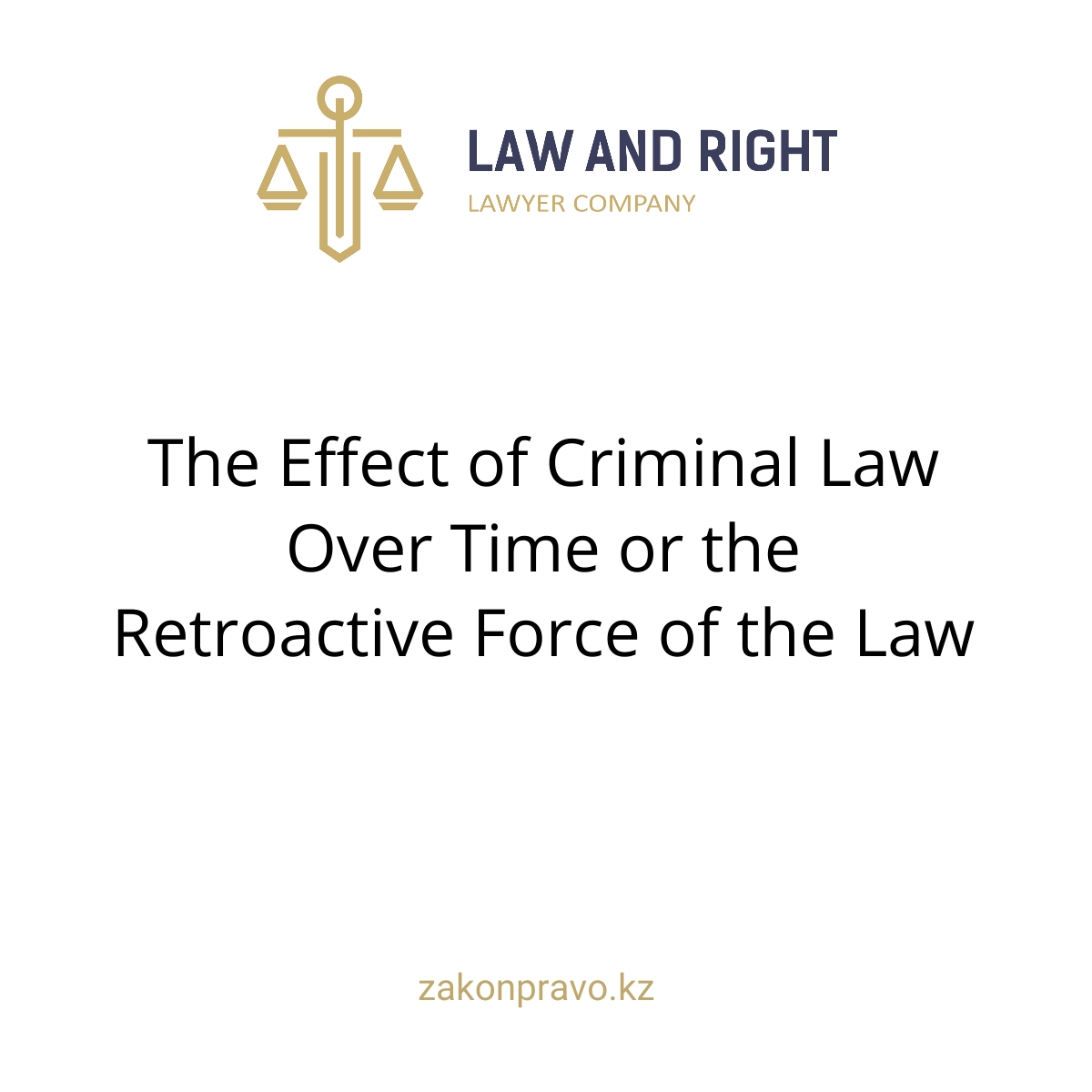The Effect of Criminal Law Over Time or the Retroactive Force of the Law
The effect of criminal law over time means that the criminality of an act, as well as the measures of punishment, are determined by the law in force at the time the crime was committed. This principle is enshrined in Article 5 of the Criminal Code of the Republic of Kazakhstan (CC RK) and is based on constitutional norms, according to which a subsequent law that worsens a person’s legal position does not have retroactive force.
1. The Law Applies Only to Future Actions
This means that liability for an act is determined only by the law that was in force at the time of its commission. The law does not apply to acts committed before its entry into force, except in cases where it mitigates or eliminates liability.
2. Temporal Moment of the Crime
The time of committing a crime is determined by the moment when the socially dangerous act (or omission) was committed, rather than the moment its consequences occurred. Even if the consequences arise later, liability is determined by the law in effect at the time of the act.
3. Article 5 of the CC RK
Article 5 of the Criminal Code establishes the principle of the effect of criminal law over time, meaning that the criminality and punishability of an act are determined by the law in force at the time of its commission. This principle is a fundamental element of the legal system and is based on the maxim nullum crimen, nulla poena sine lege ("no crime, no punishment without law").
4. Key Provisions
The criminality of an act is determined by the law in force at the time the crime was committed, not by any subsequent or prior law.
Importantly, the time of commission of the crime is considered the moment of the socially dangerous act or omission, even if the consequences occur later.
5. Normative Resolutions of the Supreme Court of the Republic of Kazakhstan
Normative Resolution No. 15 of the Supreme Court of the Republic of Kazakhstan dated December 22, 2016, “On Judicial Practice in Applying Article 6 of the Criminal Code of the Republic of Kazakhstan,” emphasizes the necessity of applying the law in force at the time of the crime.
Normative Resolution No. 4 of the Supreme Court of the Republic of Kazakhstan dated June 25, 2015, “On Certain Issues of Imposing Criminal Punishment,” confirms that in case of changes in legislation, the law mitigating punishment applies to the offender.
6. Connection with the Constitution of the Republic of Kazakhstan
Article 77 of the Constitution of the Republic of Kazakhstan establishes the principle of applying criminal law over time, stating that "a law establishing or aggravating liability does not have retroactive force." This principle also supports the idea that a law mitigating liability may be applied to offenses committed before its enactment.
7. Application of Other Codes and Laws
The Criminal Procedure Code of the Republic of Kazakhstan, in Articles 5 and 6, establishes procedural aspects of the application of criminal law over time and provides for the application of the law in force at the time of the offense.
The Code of Administrative Offenses of the Republic of Kazakhstan (Articles 4 and 5) states that administrative offenses are also determined based on the law in force at the time of their commission.
8. Additional Aspects
If, after the commission of a crime, the legislation mitigates liability or decriminalizes the act, the new law applies, following the principle of humanization of legislation. However, if the punishment is increased, the new law does not have retroactive force.
Thus, the principle of the effect of criminal law over time is enshrined at the legislative level and is regulated not only by the Criminal Code but also by the Constitution and other normative legal acts of the Republic of Kazakhstan.
Attention!
Law and Law Law Law draws your attention to the fact that this document is basic and does not always meet the requirements of a particular situation. Our lawyers are ready to assist you in legal advice, drawing up any legal document suitable for your situation.
For more information, please contact a Lawyer / Attorney by phone: +7 (708) 971-78-58; +7 (700) 978 5755, +7 (700) 978 5085.
Attorney at Law Almaty Lawyer Legal Services Legal Advice Civil Criminal Administrative Cases Disputes Protection Arbitration Law Firm Kazakhstan Law Office Court Cases


